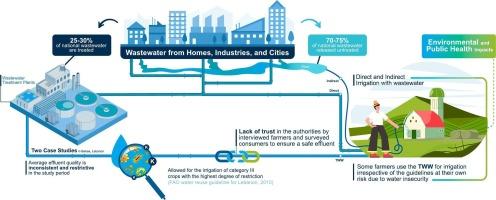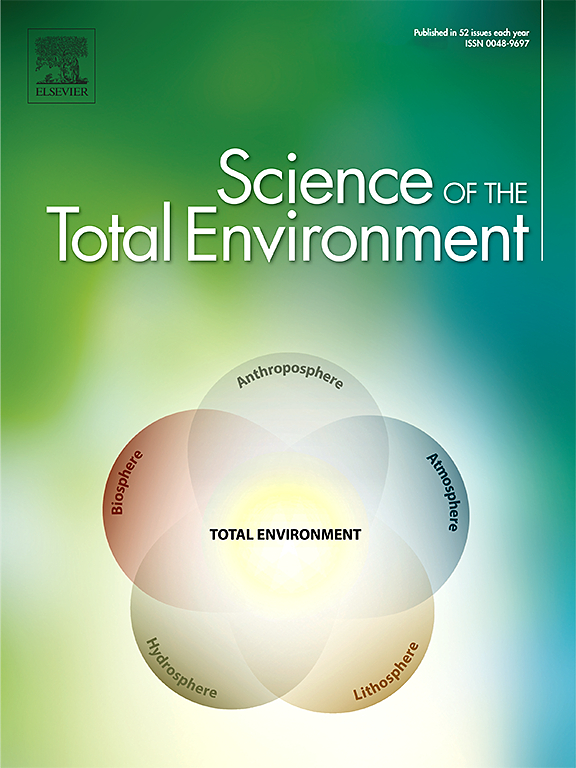半干旱区经处理的废水回用灌溉
IF 8
1区 环境科学与生态学
Q1 ENVIRONMENTAL SCIENCES
引用次数: 0
摘要
在全球范围内,农业消耗了72%的淡水资源。在这一领域,随着水需求的增加和未得到满足以及供水压力的加剧,预计水供需缺口将扩大。经过处理的废水回用(TWWR)作为灌溉的替代水源,增加了水的可用性并减少了淡水的过度开发。然而,其安全性和社会可接受性是其应用的先决条件。本研究旨在确定贝卡谷地的黎巴嫩农民以及一般黎巴嫩社区的消费者对农业中安全TWWR的意愿。该研究进一步表征了贝卡两个污水处理厂用于灌溉的TWW质量,以评估其环境和健康风险。结果表明,农民和消费者对使用和接受安全的TWW灌溉具有很高的意愿。相比之下,大多数人不相信当局能够确保灌溉用水的安全。这种看法与现实相符,因为该地区两个污水处理厂的污水质量受到长期国家治理不善、腐败、破坏性经济危机和燃料短缺的影响。尽管有这些限制,一些农民还是不顾指导方针,用这些排水口灌溉。因此,一些农民并没有完全意识到不安全的TWW灌溉的风险,但随着水安全问题的恶化,他们可能没有其他选择。尽管面临挑战,但在遵守拟议的技术建议后,TWW仍然是一种可持续的选择,质量得到了改善,这些建议是在进一步监测和调查的基础上决定的,假设资金可用性和电力供应得到改善,并辅以灌溉层面的建议,以减轻其剩余的风险。最重要的是,提出了促进水再利用和克服公众反对的建议。这项工作为干旱地区未来的水提供了见解。本文章由计算机程序翻译,如有差异,请以英文原文为准。

Treated wastewater reuse for irrigation in a semi-arid region
Globally, agriculture consumes 72 % of the freshwater resources. In this sector, the water supply-demand gap is predicted to increase with the elevated and unmet water demand and the exacerbating water supply pressure. Treated wastewater reuse (TWWR), as an alternative water source for irrigation, increases water availability and reduces the overexploitation of freshwater. Nonetheless, its safe quality and social acceptability are prerequisites for its application. This study aims to determine the willingness of Lebanese farmers in the Bekaa Valley, as well as consumers from the general Lebanese communities toward safe TWWR in agriculture. The study further characterizes the TWW quality for reuse in irrigation from two wastewater treatment plants (WWTPs) in Bekaa to evaluate their environmental and health risks.
The results revealed that farmers and consumers have a very high willingness to use and accept the use of safe TWW for irrigation. In contrast, the majority do not trust the authorities to ensure safe effluents for irrigation. This perception matches the reality due to the restrictive quality effluent of two WWTPs in the region influenced by chronic poor national governance, corruption, devastating economic crisis, and fuel shortage. Despite these restrictions, some farmers are irrigating with these outlets irrespective of the guidelines. Hence, some farmers are not fully aware of the risks of unsafe TWW irrigation, but they might not have another alternative with the worsened water security issues.
Despite the challenges, TWW remains a sustainable alternative improved in quality upon abiding by the proposed technical recommendations, decided upon further monitoring and investigation assuming funding availability and improvement in electricity provisioning, complemented by recommendations at the irrigation level to mitigate its remaining risks. Most importantly, recommendations to promote water reuse and overcome public opposition are suggested. This work provides insights for the future of water for arid areas.
求助全文
通过发布文献求助,成功后即可免费获取论文全文。
去求助
来源期刊

Science of the Total Environment
环境科学-环境科学
CiteScore
17.60
自引率
10.20%
发文量
8726
审稿时长
2.4 months
期刊介绍:
The Science of the Total Environment is an international journal dedicated to scientific research on the environment and its interaction with humanity. It covers a wide range of disciplines and seeks to publish innovative, hypothesis-driven, and impactful research that explores the entire environment, including the atmosphere, lithosphere, hydrosphere, biosphere, and anthroposphere.
The journal's updated Aims & Scope emphasizes the importance of interdisciplinary environmental research with broad impact. Priority is given to studies that advance fundamental understanding and explore the interconnectedness of multiple environmental spheres. Field studies are preferred, while laboratory experiments must demonstrate significant methodological advancements or mechanistic insights with direct relevance to the environment.
 求助内容:
求助内容: 应助结果提醒方式:
应助结果提醒方式:


